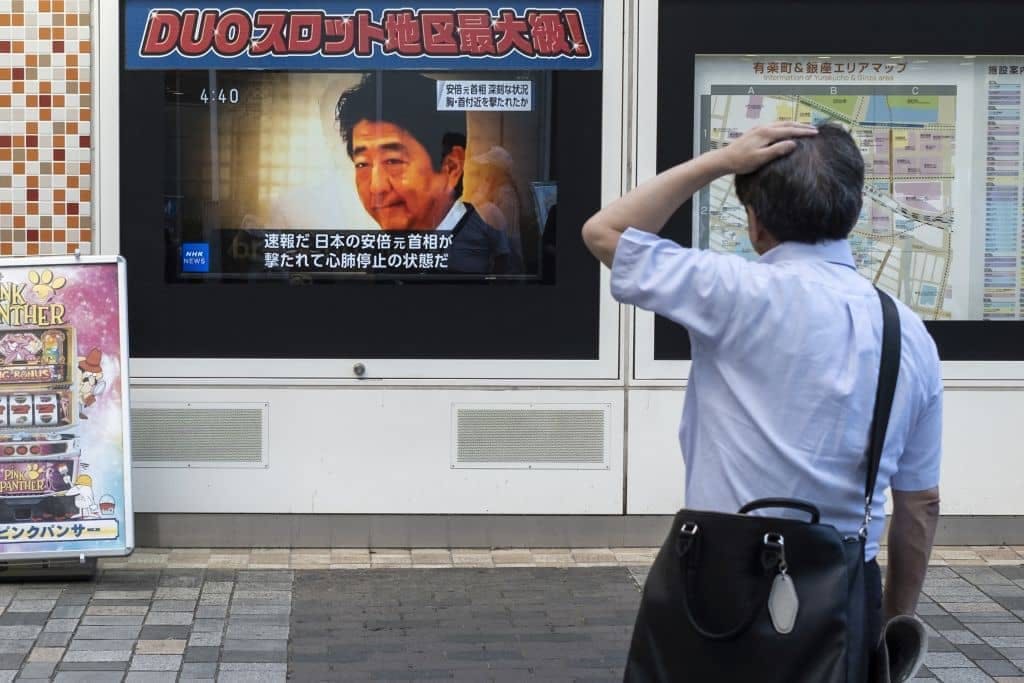Tokyo
While not quite on the scale of Her Majesty’s service, Tuesday’s state funeral of Japan’s longest serving PM Shinzo Abe, gunned down while campaigning on the streets of Nara in July, will be an extravagant affair. The ceremony will take place at the Nippon Budokan in central Tokyo with approximately 6,000 attendees including the US Vice President Kamala Harris, Indian prime minister Narendra Modi, and Australian PM Anthony Albanese. Theresa May will represent the UK. It will cost 1.6 billion yen (10.5 million pounds).
The event has become mired in controversy. Many in Japan are fiercely opposed to the decision, made by current PM Fumio Kishida, to grant a state funeral to Abe, allegedly to placate his party’s right-wing. With opposition growing, commentators are speculating that Japan’s current leader has made a significant error.
The revelations following the assassination of Shinzo Abe have led many to angrily question the secretive workings of Japanese politics
Kishida defended his decision with reference to Abe’s contribution to Japanese society, but critics say this is at best irrelevant, at worst untrue. Since the nullification of the imperial right to grant state funerals in 1947, the legal basis for a government to do so is dubious. Kenta Izumi, leader of Japan’s main opposition party the CDC, remarked ‘the cabinet has made this decision based on no existing legal precedent’ and claimed that the decision was pushed through with ‘brute force’ and no consultation with constitutional scholars. His party’s executives will boycott the event.
As will the JCP (Japanese Communist party), the country’s fifth largest, which has focused its criticism on the pressure a state funeral imposes on the Japanese people. Shinzo Abe had many supporters, and everyone was horrified by the manner of his death, but he was also a highly controversial figure whose latter years were marred by serious scandals. A state funeral for Tony Blair might be a rough British analogy.
In parliament, JCP lawmaker (MP) Tetsuya Shiokawa criticised a decision which ‘infringes on freedom of thought and conscience and leads to coercion’. This forced Kishida to stress that citizens would not be forced ‘into an expression of mourning’. Given that this is precisely what a state funeral implies, this seems disingenuous. Two other major parties, Reiwa Shinsengumi, and the SDP as well as three state governors and prominent invitees such as veteran journalist Soichiro Tawara will stay away on principle. And there are signs the gloom has been picked up by some of the foreign invitees: Barack Obama and Justin Trudeau have cancelled.
As for the Japanese public, resentment is growing at an alarming rate. There is an online petition with 400,000 signatures calling for the state funeral to be cancelled and demonstrations on the day are expected. An early September poll found that 56 per cent of Japanese people now opposed staging a state funeral, up ten points from August. Kishida, whose personal approval ratings have plummeted, has been reduced to claiming the event will be a precious opportunity for ‘funeral diplomacy’ (each representative will have a 15-minute meeting with Japan’s leader).
But the public’s opprobrium is not down merely to constitutional propriety or the expense at a time of fiscal difficulty, (though the government initial claim that the cost would be no more than 250 million yen (£1.5 million) hardly helped). An additional factor is the growing controversy about the circumstances behind Abe’s assassination.
It has emerged that Tetsuya Yamagami, the man arrested for Abe’s killing, had a very specific motive. He alleged that Abe’s family, starting with Shinzo’s grandfather former PM Nobusuke Kishi had collaborated with the Korea-based Unification Church (‘the Moonies’) in a secret pact that allowed the church to establish a profitable offshoot in Japan in return for electoral support from the church’s army of followers. Yamagami claimed his family was devastated after his mother, upon his father’s suicide, was targeted by the church and coerced into making donations that she simply could not afford.
Yamagami’s claims have been verified. The Unification church has confirmed Yamagami’s mother was a member and an embarrassing video message sent by Shinzo Abe to the church’s current leader has gone viral. The LDP has been forced to admit to ongoing ties with the organisation: an internal probe by the party found that 179 out of 379 party members had links to the church.
So angered are people here that there has even been a measure of twisted sympathy expressed for Yamagami. The weekly magazine SPA! featured Yamagami on the cover and ran an article highlighting his traumatic life as a victim of the Unification church, Japan’s ruling party, and Japanese society as a whole. There are even besotted internet fans known as ‘Yamagami girls’: cash and gifts have been forwarded to him in prison. An online petition calling for him to receive a reduced sentence has garnered thousands of signatures.
These views may be at the extreme but the revelations following the assassination of Shinzo Abe have led many to angrily question the secretive workings of Japanese politics. To hold a national ceremony of mourning, invite the world to attend and ask the public to foot the bill looks like a glaring example of a singularly egregious error in Japanese culture: a misjudgment of the public mood, or a failure, as they say here, to ‘read the air’.







Comments